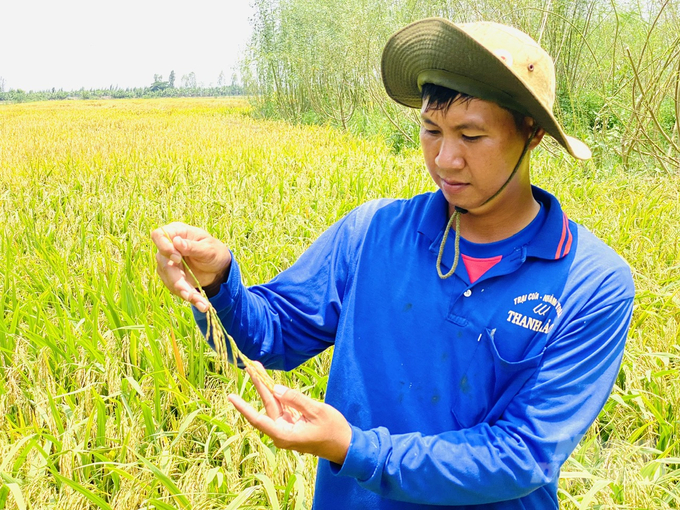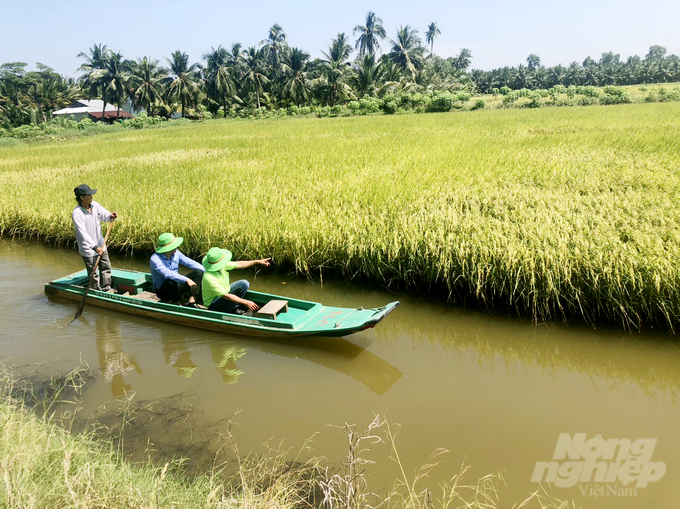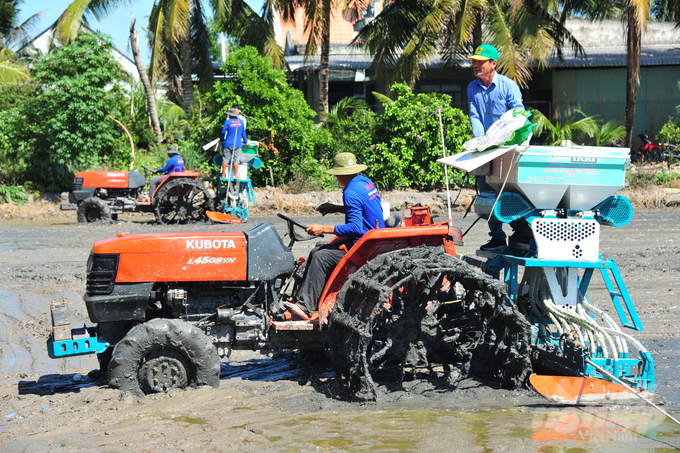May 23, 2025 | 13:51 GMT +7
May 23, 2025 | 13:51 GMT +7
Hotline: 0913.378.918
May 23, 2025 | 13:51 GMT +7
Hotline: 0913.378.918

The organic production model “rice - fish - duck” at Quyet Tien Cooperative in Phu Thanh A commune, Tam Nong district, Dong Thap province shows an economic efficiency of VND 3 - 4 million/ha/crop higher than traditional models. Photo: Le Hoang Vu.
Rice cultivation in the natural direction is an inevitable trend. It brings many sustainable benefits, such as achieving economic goals and protecting the environment. The aim is to ensure safety and protect the future of the Mekong Delta region in the context of increasingly complex developments of climate change.
Professor Andy Large, Project Director of Newcastle University (UK), recently commented on the research results of the three main components of the project "Research on the Mekong Delta phase 2019 - 2024" (Living Deltas Hub). "Developing agriculture in a natural direction is not only about economic benefits but it also carries strong historical, social and local cultural elements, the present and future generations of the Mekong Delta in accordance with the spirit of Resolution 120 on sustainable development of the Mekong Delta in adaptation to climate change".
The Mekong Delta is facing many problems, primarily unsustainable development and impacts from hydropower projects upstream. Along with that, the Mekong Delta has to deal with urgent challenges from climate change as it results in changes in rainfall patterns as well as increased frequency of drought and saltwater intrusion, thus affecting development prospects as well as the long-term livelihoods of the people.

Rice - shrimp production model in Kien Giang. Photo: Le Hoang Vu.
Professor Andy Large believes that responding to climate change through natural solutions is an urgent requirement. As a matter of fact, localities in the Mekong Delta have been implementing many agricultural cultivation solutions in the natural direction such as the Scheme for sustainable development of 1 million ha of high-quality and low-emission rice cultivation associated with green growth in the Mekong Delta by 2030.
Farmers also utilize smart rice cultivation models adaptive to climate change, models that promote the use of organic fertilizers and biological pesticides, circular livestock farming models, economy structures under the forest canopy, rice - shrimp models, and the list goes on.
Dr. Nguyen Van Kien, Project Leader of An Giang University, shares a similar view. The ecological and organic rice farming model is considered a unique form of natural cultivation within the Mekong Delta region, helping farmers adapt in harmony with nature and set up control following the laws of nature to bring benefits to the people and protect the ecological environment.
“The foundation for promoting the development of organic agriculture in general and organic rice in particular is already there, not to mention this is even an inevitable trend. However, agroproduction in the natural direction still shows little value and farmers have not gained much benefit. On the other hand, not all models in the natural direction are highly effective. Therefore, it is essential to build small ‘prototype’ models to demonstrate effectiveness, then expand, combine with regional integration, consumption linkages and market development to maximize efficiency and create a culture of agriculture in harmony with nature among the people,” said Dr. Nguyen Van Kien.

The Mekong Delta is implementing the Scheme for sustainable development of 1 million ha of high-quality, low-emission rice with great enthusiasm. Photo: Le Hoang Vu.
The Ministry of Agriculture and Rural Development is implementing a Scheme for sustainable development of 1 million ha of high-quality, low-emission rice cultivation associated with green growth in the Mekong Delta. Implementing the scheme means moving towards organic rice production by applying production techniques such as integrated pest management (IPM), alternate wetting and drying (AWD), “1 must, 5 reductions” and “3 reductions, 3 increases”.
If organic farming practices are implemented simultaneously and optimally across the entire 1.9 million ha of rice fields, by 2030 emissions in the Mekong Delta will be reduced by nearly 11 million tons of CO2 per year. Reusing 70% of straw for other uses will reduce greenhouse gas emissions by approximately 50% in comparison to just burning straw in the fields.
The Mekong Delta can also reduce 12 - 23 tons of CO2 by promoting climate-adaptive cultivation methods and good agricultural practices, replacing inefficient rice land with climate-smart farming systems, reducing post-harvest losses, and better managing agricultural by-products specifically straw.
Translated by Samuel Pham

(VAN) The People's Committee of Tra Vinh province has approved an adjustment to the investment policy for the Green Hydrogen Plant project, increasing its area to approximately 52.76 hectares.
![Reducing emissions from rice fields: [2] Farmers’ commitment to the soil](https://t.ex-cdn.com/nongnghiepmoitruong.vn/608w/files/news/2025/05/05/dsc08881jpg-nongnghiep-140632.jpg)
(VAN) Clean rice cultivation model in Thuong Tan commune, Bac Tan Uyen district, is assisting local residents in achieving sustainable agriculture by substantially reducing costs, increasing productivity, and protecting the environment.

(VAN) At the conference to disseminate Resolution No. 68, AgriS introduced its digital agricultural ecosystem and reaffirmed its commitment to accompanying the Government in promoting private sector development and sustainable agriculture.

(VAN) 'Blue Ocean - Blue Foods' initiative is designed to restore marine ecosystems and establish sustainable livelihoods for local communities by cultivating a minimum of 1,000 hectares of cottonii seaweed in the first three years.
/2025/05/21/4642-3-112707_603.jpg)
(VAN) The V-SCOPE project has made direct contributions to three out of six pillars of the Comprehensive Strategic Partnership between Vietnam and Australia.

(VAN) Facing the threat of rabies spreading to the community, Gia Lai province urgently carries out measures to vaccinate dogs and cats on a large scale.

(VAN) Disease-free livestock farming not only protects livestock herds but also stabilizes production and livelihoods for many farmers in Tuyen Quang.